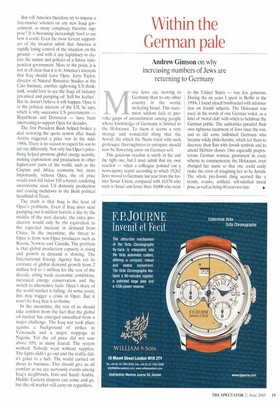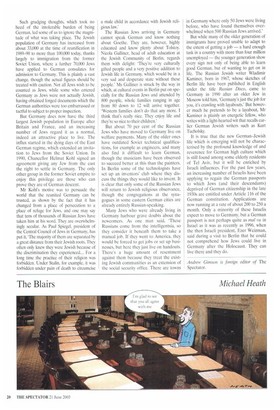Within the German pale
Andrew Gimson on why increasing numbers of Jews are returning to Germany More Jews are moving to Germany than to any other country in the world, including Israel. This statement seldom fails to provoke gasps of astonishment among people whose knowledge of Germany is limited to the Holocaust. To them it seems a very strange and wonderful thing that the Jewish life which the Nazis tried with such grotesque thoroughness to extirpate should now be flowering anew on German soil.
This generous reaction is surely in the end the right one, but I must admit that my own reaction — when a colleague pointed out a news-agency report according to which 19,262 Jews moved to Germany last year from the former Soviet Union, compared with 18,878 who went to Israel and fewer than 10,000 who went
to the United States — was less generous. During the six years I spent in Berlin in the 1990s, I found myself bombarded with information on Jewish subjects. The Holocaust was used, in the words of one German writer, as a kind of 'moral club' with which to belabour the German public. The authorities paraded their own righteous treatment of Jews since the war, and so did some individual Germans who became wildly philo-Semitic, which led them to decorate their flats with Jewish symbols and to attend Hebrew classes. One especially preposterous German woman, prominent in every scheme to commemorate the Holocaust, even changed her name so that one could easily make the error of imagining her to be Jewish. The whole pro-Jewish thing seemed like a trendy, evasive, artificial, self-satisfied moral pose, as well as being 60 years too late. Such grudging thoughts, which took no heed of the intolerable burden of being German, led some of us to ignore the magnitude of what was taking place. The Jewish population of Germany has increased from about 33,000 at the time of reunification in 1989-90 to more than 100,000 today, thanks largely to immigration from the former Soviet Union, where a further 70,000 Jews have applied to German consulates for admission to Germany. This is plainly a vast change, though the actual figures should be treated with caution. Not all Jews wish to be counted as Jews, while some who entered Germany as Jews were not actually Jewish, having obtained forged documents which the German authorities were too embarrassed or tactful to subject to proper inspection.
But Germany does now have the third largest Jewish population in Europe after Britain and France, and an increasing number of Jews regard it as a normal, indeed an attractive place to live. The influx started in the dying days of the East German regime, which extended an invitation to Jews from the Soviet Union. In 1990, Chancellor Helmut Kohl signed an agreement giving any Jew from the east the right to settle in Germany. The only other group in the former Soviet empire to enjoy this privilege are those who can prove they are of German descent.
Mr Kohl's motive was to persuade the world that the reunited Germany can be trusted, as shown by the fact that it has changed from a place of persecution to a place of refuge for Jews, and one may say that tens of thousands of Russian Jews have taken him at his word. They are overwhelmingly secular. As Paul Spiegel, president of the Central Council of Jews in Germany, has put it, 'The majority of them are separated by a great distance from their Jewish roots. They often only knew they were Jewish because of the discrimination they experienced.... For a long time the practice of their religion was forbidden. Under Stalin, for example. it was forbidden under pain of death to circumcise a male child in accordance with Jewish religious law.'
The Russian Jews arriving in Germany cannot speak German and know nothing about Goethe. They are, however, highly educated and know plenty about Tolstoy. Nicola Galliner, head of adult education at the Jewish Community of Berlin, regards them with delight: 'They're vety culturally gifted people and a very positive addition to Jewish life in Germany, which would be in a very sad and desperate state without these people.' Ms Galliner is struck by the way in which, at cultural events in Berlin put on specially for the Russian Jews and attended by 800 people, whole families ranging in age from 80 down to 12 will arrive together. 'Western families don't do that any more. I think that's really nice. They enjoy life and they're so nice to their children.'
But about 70 per cent of the Russian Jews who have moved to Germany live on welfare payments. Many of the older ones have outdated Soviet technical qualifications, for example as engineers, and many also find it difficult to learn German, though the musicians have been observed to succeed better at this than the painters. In Berlin some of the technologists have set up an inventors' club where they discuss the things they would like to invent. It is clear that only some of the Russian Jews will return to Jewish religious observance, though the congregations at the synagogues in some eastern German cities are already entirely Russian-speaking.
Many Jews who were already living in Germany harbour grave doubts about the newcomers. As one man said, 'These Russians come from the intelligentsia, so they consider it beneath them to take a manual job. If they went to America, they would be forced to get jobs or set up businesses, but here they just live on handouts. There's a huge amount of resentment against them because they treat the existing Jewish communities as an extension of the social security office. There are towns in Germany where only 50 Jews were living before, who have found themselves overwhelmed when 500 Russian Jews arrived.'
But while many of the older generation of immigrants have proved unable to adapt to the extent of getting a job — a hard enough task in a country with more than four million unemployed — the younger generation show every sign not only of being able to learn good German, but of wanting to get on in life. The Russian Jewish writer Wladimir Kaminer, born in 1967, whose sketches of Berlin life have been published in English under the title Russian Disco, came to Germany in 1990 after an older Jew in Moscow told him, 'Germany's just the job for you, it's crawling with layabouts.' But however much he pretends to be a layabout, Mr Kaminer is plainly an energetic fellow, who writes with a light-hearted wit that recalls earlier German Jewish writers such as Kurt Tucholsky.
It is true that the new German–Jewish life which is emerging will not be characterised by the profound knowledge of and reverence for German high culture which is still found among some elderly residents of Tel Aviv, but it will be enriched by Israeli influences. For the past few years, an increasing number of Israelis have been applying to regain the German passports to which Jews (and their descendants) deprived of German citizenship in the late 1930s are entitled under Article 116 of the German constitution. Applications are now running at a rate of about 200 to 250 a month. Only a minority of these Israelis expect to move to Germany, but a German passport is not perhaps quite as mal vu in Israel as it was as recently as 1996, when the then Israeli president, Ezer Weizman, said during a visit to Berlin that he could not comprehend how Jews could live in Germany after the Holocaust. They can live there and they do.
Andrew Gimson is foreign editor of The Spectator.



































































































 Previous page
Previous page